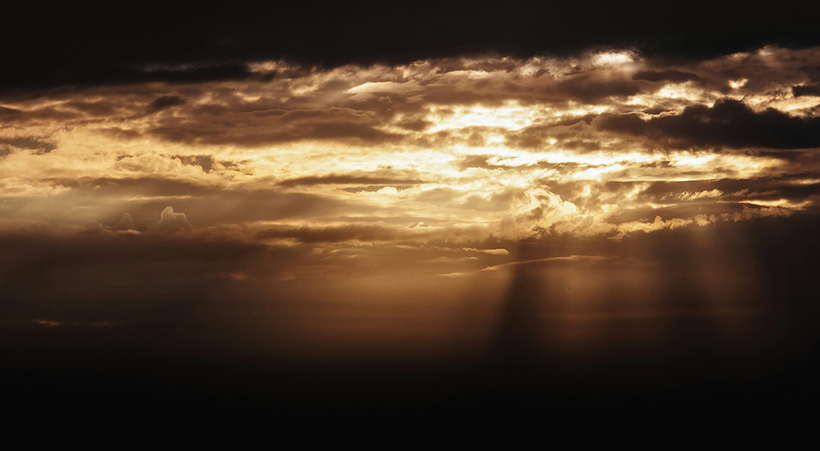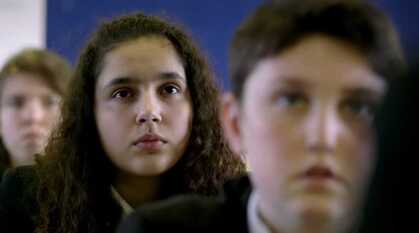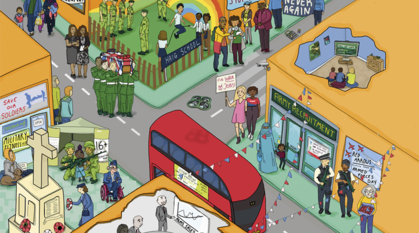Grief and hope: marking two years of war in Ukraine
Charlotte Cooper mourns the human cost of two years of war in Ukraine and escalating global conflict, and reflects on how to hold grief and hope at the same time.

24 February marks two years since the Russian invasion of Ukraine, and this anniversary reminds us to take stock of the enormous toll the war has taken. As well as those who have suffered death, injury or displacement in the war, this anniversary I'll be holding in my heart those who are courageously objecting to participating in it, or working for peace and nonviolent resistance, often at great risk.
According to the UN, the number of civilians killed in the war topped 10,000 late last year. Military figures are more contested but US officials estimated that the number of Russian and Ukrainian troops killed or wounded was approaching half a million as early as last summer.
The anniversary also gives me pause to reflect on how the state of global conflict and militarisation has shifted alarmingly over the last two years. Recent figures show that global military spending increased 9% to $2.2 trillion in 2023 – its highest ever level – and it is only projected to increase further this year. Last month saw military leaders stirring up debates about conscription and the need for Britain to prepare for a potential war with Russia. And of course, the unfathomable suffering caused by Hamas's attacks on Israel in October, Israel's subsequent bombardment of Gaza, and the continuing complicity of our leaders in this despite huge grassroots calls for a ceasefire weighs heavily on all of us. In Sudan's less-talked about civil war, similar numbers of civilians have been killed as in Ukraine in only a year, and millions more are displaced amid a humanitarian crisis.
All this human suffering and escalating talk of war is hard to hold. I'm very conscious of the number of people, both within and outside the Quaker community, struggling with feelings of grief, hopelessness and powerlessness, and understandably so. It can be tempting in these times to lose hope in peace and to believe that military responses are the only realistic ones in the face of such conflict. This is the way that the logic of militarisation works; the arms races, the escalating rhetoric, and the funding and fuelling of war instead of peace are all supposed to be realistic responses to the dangers of the world. But when they succeed only in making the world seem ever more dangerous, the response from proponents of militarism is that we need yet more of the same. As Quaker peacebuilder Diana Francis wrote in the 1990s, “military 'solutions' are an addiction: there will never be a good time to give them up. There will always be the voice that whispers that just a little bit of armed force will do the trick."
It seems to me that the task facing peacemakers in these difficult times is to try to interrupt these vicious cycles of violence and militarisation, rather than watching in hopelessness as they deepen. There are different ways to do this. One is by saying 'no'; by resisting war and militarisation and refusing to cooperate with them. That could be by writing to your MP or joining a protest demanding a ceasefire in Gaza, or by campaigning during the Global Days of Action on Military Spending in April and May. I am heartened by the amount of this action happening at the moment. In my home town in the north of England, for example, there is a huge increase in people nonviolently organising against the arms trade, resisting UK complicity in sending arms to Israel.
Another way is by saying 'yes' to something different, by acting in ways that refuse to accept that the world is too dangerous for peace and that instead affirm our common humanity. The Quaker peace testimony tells us that it is meaningful to do this at every level, from the interpersonal to the local to the international. We can take small actions in our everyday lives, such as building friendship in our neighbourhoods and communities. We can uphold and support peacemakers internationally and express solidarity with them wherever possible. And we can articulate a different vision of what safety means to us and what security policy might look like if it genuinely worked towards the wellbeing of people and planet rather than doubling down on the failures of the militarised approach of the last two decades.


